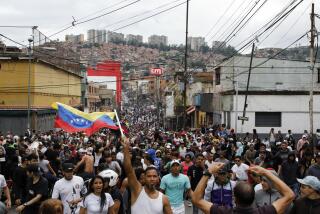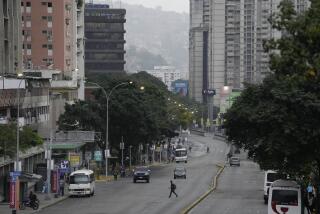Ex-general takes early lead in Guatemala presidential vote
Reporting from Mexico City — Violence-weary Guatemalan voters went to the polls Sunday to pick a new president, with a former general, who vowed to get tough on crime, taking the early lead.
Sporadic bloodshed, including a shooting that left a police officer dead, was reported as voters elected a president and vice president, representatives of Congress and hundreds of mayors and municipal council members.
Otto Perez Molina, promising a mano duro, or firm hand, against crime, had led nine other candidates in preelection polls. An outright majority was needed to avoid a runoff in two months.
By evening, with a tiny share of votes counted, Perez Molina held a lead over his two nearest competitors — Manuel Baldizon, a congressman and wealthy business owner, and Eduardo Suger, a university rector. With 5% of the ballots tabulated, the retired general had 37% of the vote, Reuters reported.
In recent interviews, Guatemalans said violence, mainly due to drug trafficking groups and local street gangs, was topmost on their minds heading to the polls.
The growing presence of Mexican drug gangs has spawned massacres in the rural zones in northern Guatemala, where the government has struggled to assert control. In the capital, Guatemala City, rampant armed robberies, including frequent holdups on city buses in which drivers are often slain, have left residents in a state of fear.
Perez Molina, 60, and his rightist Patriot Party appeared to have won over many residents by promising a tough-nosed approach on crime. His top competitor, Baldizon, also made crime a campaign focus.
Baldizon, 41, had appeared to gain momentum in the final stretch, cutting Perez Molina’s huge lead in a poll to fewer than 20 percentage points. In Clark Kent-style glasses and slicked hair, Baldizon cast himself as a populist with plain-spoken remedies, such as implementing public executions. But many critics painted him as a right-wing demagogue.
A court decision in August kept former First Lady Sandra Torres from seeking the office held by her ex-husband, leftist Alvaro Colom. The couple divorced to get around a law prohibiting a president’s close relatives from running for the post. The law also bars Colom from seeking reelection.
Suger was in third place in most surveys. The only leftist in the race was Rigoberta Menchu, a Maya activist and Nobel Peace Prize laureate, but polls showed her with minimal support.
Perez Molina, an army officer who fought in the 35-year civil war but later signed peace accords, lost to Colom in 2007. Since then, he has campaigned steadily, seeking inroads in the countryside, where he ran weakest last time.
Some activists have worried that the former general’s iron-hand message may augur a return to the days when U.S.-backed military strongmen ruled Guatemala with little regard for basic human rights. The civil war, which ended in 1996, left more than 200,000 dead or missing, mostly at the hands of the army or paramilitary squads.
Rights advocates cite documents and other evidence in accusing Perez Molina, once the head of army intelligence, of taking part in wartime abuses. But he has denied the allegations and his army career was not a big campaign issue.
Special correspondent Alex Renderos in San Salvador contributed to this report.
More to Read
Sign up for Essential California
The most important California stories and recommendations in your inbox every morning.
You may occasionally receive promotional content from the Los Angeles Times.










